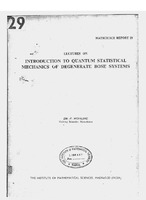- DSpace Home
- →
- MATSCIENCE Reports
- →
- MATSCIENCE Reports
- →
- View Item
JavaScript is disabled for your browser. Some features of this site may not work without it.
| dc.contributor.author | Mohling, F. | |
| dc.date.accessioned | 2010-06-08T11:28:07Z | |
| dc.date.available | 2010-06-08T11:28:07Z | |
| dc.date.issued | 2010-06-08T11:28:07Z | |
| dc.date.submitted | 1964 | |
| dc.identifier.uri | https://dspace.imsc.res.in/xmlui/handle/123456789/196 | |
| dc.description.abstract | These lectures were given by the visiting Scientist, Dr. Franz Mohling, from University of Colorado during 1964. Lecture- I deals with Free Bose Gas; The formula for the average number of quanta in a single state could also be used to derive thermodynamical properties of black body radiation by elementary means. Here a Bose particle is defined to be any particle which can occupy a quantum state independently of how many other (identical) Bose particles are already in that state. A Fermi particle is one which cannot occupy a quantum state if another(identical) Fermi particle is already in that state. Hence elementary particles obey either Bose - Einstein statistics, or Fermi -Dirac Statistics. The principal result obtained in lecture I was an equation for the grand partition function in X- ensemble formulation of quantum statistics: The objective of the second Lecture is to show how the grand potential may be expressed in terms of the basic two-particle interactions of a Bose system. Self-Energy Problem, Momentum Space Ordering, and Quasi-Particles are discussed in the Third Lecture. | en_US |
| dc.subject | Quantum Statistical Mechanics | en_US |
| dc.subject | Elementary Particles | en_US |
| dc.subject | Quasi Particles | en_US |
| dc.subject | Matscience Report 29 | en_US |
| dc.title | Lectures on Introduction to Quantum Statistical Mechanics of Degenerate Bose Systems [MatSciRep:29] | en_US |
| dc.type.institution | Institute of Mathematical Sciences | en_US |
| dc.description.pages | 65p. | en_US |
| dc.type.mainsub | Physics | en_US |
